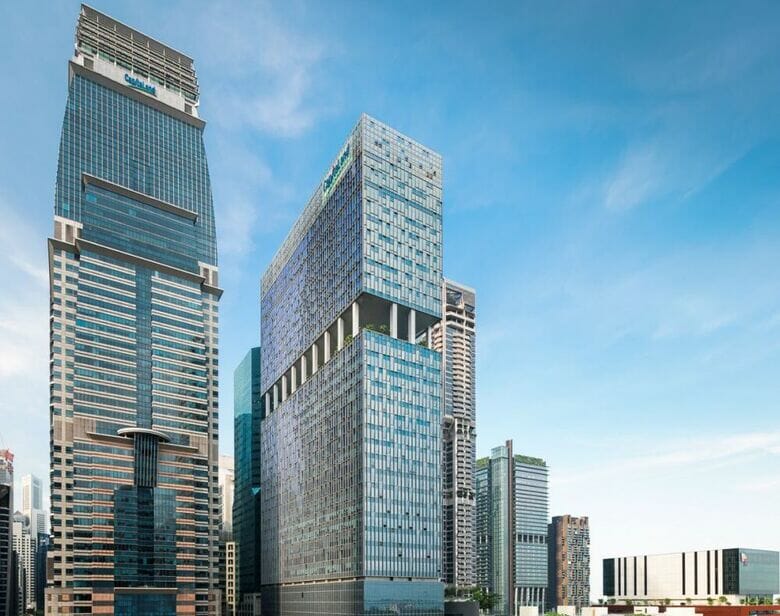
CICT acquired a 70% stake in CapitaSky tower in downtown Singapore last year. (Image: CapitaLand)
Rising interest rates are denting the returns of some of Singapore’s biggest landlords, with CapitaLand Integrated Commercial Trust (CICT) achieving a 1.7 percent uptick in distributable income for the first half of the year as higher financing costs wiped out revenue gains.
CICT, the largest SGX-listed REIT by market cap, booked S$774.8 million ($580 million) in gross revenue in the January to June period, up 12.7 percent from a year ago, which contributed to a 10 percent increase in its S$552.3 million in net property income for the period, the REIT manager announced Tuesday.
However, the S$51 million in additional property income was balanced against nearly $50 million in additional financing costs, with the trust announcing S$353.2 million ($265 million) in distributable income – up by less than S$6 million from the same period last year.
With interest rates rising, CICT’s leadership is vowing to keep a lid on finance costs as it seeks to squeeze more returns from its portfolio. “We will continue to exercise prudence in our capital management and evaluate any organic growth and inorganic opportunities with financial discipline,” said Tony Tan, chief executive officer of the manager.
Healthy Leasing
Higher rental income from its Singapore properties, including grade A office buildings Asia Square 2, CapitaGreen and Capital Tower helped along the trust’s earnings, which also benefited from revenue generated by recently acquired assets such as its majority stake in CapitaSky and a trio of three Sydney office properties.

Tony Tan, CEO of CICT’s manager
Across its three markets, retail remained CICT’s top money maker with S$284 million in gross revenue in the first half, up 3.3 percent year on year, followed by office revenues that rose 20 percent to S$257.1 million during the same period.
Revenue generated from its integrated development portfolio stood at S$233 million, up 65 percent from a year ago.
Despite the jump in its topline, increased property operating expenses and higher finance costs, which surged 47 percent due to additional borrowings and rising interest rates, kept the REIT’s distributable income at S$0.053 per unit at the end of June, up from S$0.052 a year earlier.
With returns narrowing, CICT says it will focus on ways to derive more value from its properties.
“Supported by a healthy balance sheet and a robust capital structure, we are well-positioned to implement our portfolio and asset management strategies effectively amidst the macro uncertainties,” Tan said.
CICT has benefited from steady occupancy rates and positive rental reversions in its retail and office assets in Singapore, which accounts for 93 percent of its S$24-billion portfolio by value. It secured about one million square feet (92,900 square metres) of new leases and renewals in the first half across its wider portfolio during the period.
Its Singapore office portfolio booked positive rent reversions of 9.6 percent at a committed occupancy of 96.6 percent during the six-month period.
The manager said new tenants leasing office space in its Singapore properties were mainly from the financial services, business consultancy and legal sectors, including global payments startup Nium, which chose Capital Tower for its headquarters.
In the retail segment, positive rent reversions reached 6.9 percent while occupancy inched up to 98.7 percent in the first half, which the manager linked to higher tenant sales and improved shopper traffic, particularly in tourist-favourite malls in the downtown core.
CICT expects to add income when its CQ@Clarke Quay shopping destination along River Valley Road reopens later this year following enhancement work.
SG Office Cools
CICT expects the retail sector to continue to improve for the rest of the year amid an ongoing rebound in tourism.
However, it foresees a moderation in office rent growth in the second half of the year as a slower economy dampens workspace demand at the same time that a wave of new office projects open in the city.
Downtown Singapore’s office market levelled off in the second quarter, with average grade A office rents rising just 0.2 percent following a 1.1 percent rise in the first three months of the year, based on data from the Urban Redevelopment Authority.
Following CICT’s Australian debut last year, the REIT sourced 7.3 percent of its first-half revenues from its three office assets in Sydney and two properties in Frankfurt.
Tan said the trust will continue focusing on strengthening its regional portfolio and undertake proactive management of its overseas properties to maximise their potential.
Leave a Reply